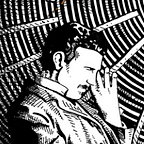Jonathan Harper talks about religious zealotry, quirkiness, and gay representation in Michael Graves’ novel.
Michael Graves
Fiction | Novel | 240 pages | 6” x 9” | Reviewed: Paperback
978–1–937627–26–3 | First Edition | $9.99-$18.00
Chelsea Station Editions | New York City | BUY HERE
I met Michael Graves briefly at a book fair in Washington, D.C. This was several years ago, and I haven’t seen him since. I had just purchased a short story collection and was making small talk with two of the vendors I knew. Sitting to the side was a polite man with a boyish face who seemed to share my acquaintances. In an attempt to be as social as possible, I asked him if he were the new Lethe Press intern. Graciously, he smiled and said no, while my friends chuckled as if I had asked something very embarrassing. Only after I left did I realize that he was the author of the book I had just purchased right in front of him.
This was a scene I replayed in my mind as I read Graves’ new novel. Parade is a quirky book. All at once, it is lighthearted and dark, pragmatic and surreal. It is the kind of book that is saturated with characters who are just eccentric and socially awkward enough to be likable and then are thrust into an endless loop of mishaps.
Elmer is overweight, is unemployed, writes letters to the president, and dreams of becoming mayor. His cousin, Reggie, is a reluctant homosexual, works for the local church, and has sex dreams involving Jesus Christ. They both suffocate in their conservative community. They fail in their current endeavors. They both develop love interests before losing them through tragic and violent means. After a winning lotto ticket and an accidental act of arson, they flee together in a stolen limousine only to come under the guidance of a fallen televangelist. Despite the dark tones of the novel, Graves seems to favor the whimsical over harsh realism. In his stories, spiritual guides come in the form of drug-dealing preachers, sexual precocious sisters, and the neglected residents of a retirement community. Characters fall from grace for the better, and there’s always a Girl Scout troupe volunteering to clean up the mess.
This is the type of novel that anticipates a reader actually questioning what he’s read. Did that really just happen? Was that really just said? In response, the author even inserts himself as an omnipresent voice into the prose:
I have watched this ritual since they were small boys. (p. 31),
I know that Elmer has thought of phoning the landlady to beg for more time. […] I know Elmer has thought of pounding on Pinky’s door once again. (p. 44),
I see smears of black ink that spot Reggie’s cheek, Reggie’s nose, Reggie’s eyelid. […] I see he has found a flurry of rapture. […] I am certain he cannot cease. (p. 122).
The religious threads of the novel bring to mind a Flannery O’Connor plot with Baz Luhrmann details. Much like The Violent Bear It Away, Elmer and Reggie are immediately distinguished by their opposing views of atheism and evangelicalism. Reggie in particular has a childlike understanding of God and initially comes across as a caricature of a repressed religious gay man. The second half resembles Wise Blood, as Reggie becomes a Hazel Motes, establishing a religion without God. Unlike Hazel, Reggie actually succeeds and shares his new doctrine with a crowd of eager supporters. Elmer’s atheism, however, remains unchanged throughout the course of the novel. However, unlike an O’Connor character, Elmer supports his cousin in an affectionate way, even becoming Reggie’s manager.
Grave’s take on religion is a risky move. He is unambiguous in the damage it causes Reggie, both emotionally and physically. Reggie loses his faith and then rises as a high-heel-wearing preacher. However, his new doctrine, written as “recipes” for good living, are just as surface level:
Recipe #8 […] If you feel lonely, just say it. If you’re jubilant, tell someone. Maybe you’re furious; then explain. […] Once you state your feelings, you’ll feel better. Everything is released. Others will know your truth. And you will be real. (p. 120).
The novel includes several of these, each with the philosophical depth of a motivational poster. There’s nothing intellectually challenging about any of them. And yet, it’s the simplicity that makes them charming, that makes Reggie likable and what earns him a cult following. Perhaps that’s the point, as Graves often rewards characters who believe that if they want something hard enough, it will happen.
At times, Parade feels a tad unbalanced. Elmer, who is even more nuanced a character than Reggie, drifts to a supporting role. His great political schemes fade into finding romance and watching over his cousin. Their descent into hedonism seems to offer more emotional consequences than physical. But Graves is a very sophisticated writer who is able to juggle extreme quirkiness with real human motivation. His characters want the same things as their readers.
As the omnipresent narrator says,
[…] life has bled into a mix of pop religion, glitz, and very, very good deeds. Yes. Both are becoming a bit worn. But I see them brimming with such growth. The truth is near. And true happiness is near too. Please do read more.
This review has been moved from its original home on The Spark blog, where it was first published on March 14, 2016. The Spark is now defunct, and all stories have migrated to The Coil for posterity.
